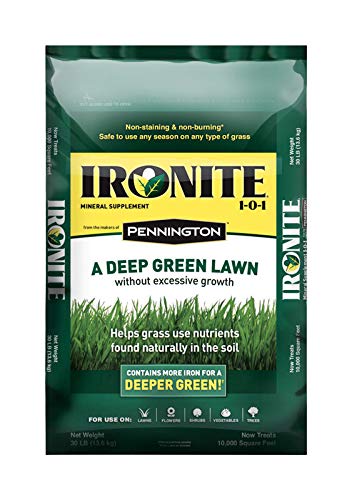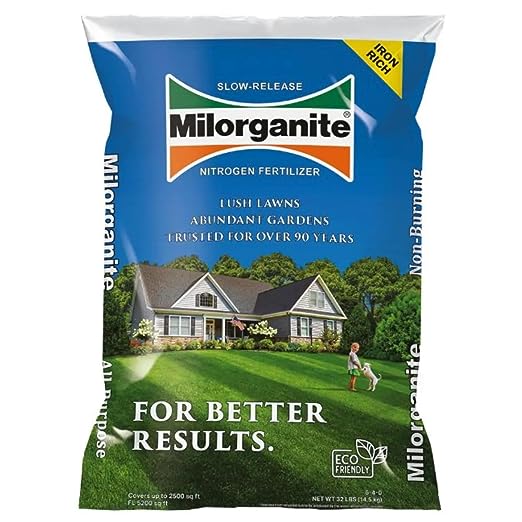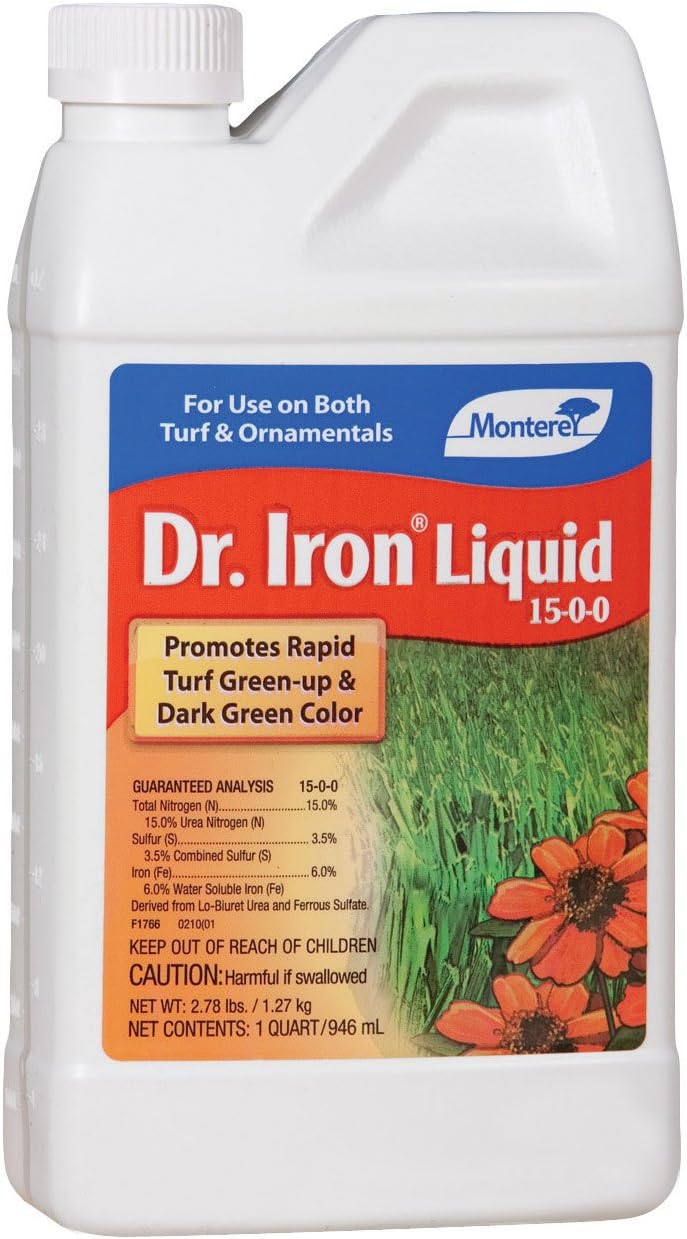Are you hoping to give your garden the best fertilizer possible for optimal growth? You’ve likely heard mentions of several different fertilizers, including Ironite and Milorganite. While both are excellent options to help ensure your plants receive the nutrients they need for healthy development.
As a gardener, choosing the right fertilizer for your plants can make all the difference between a thriving garden and a lackluster one. In this guide, we’ll compare two popular fertilizers – Ironite and Milorganite – so that you can decide when to select the best option for your garden.
Ironite vs Milorganite Fertilizers: A Guide for Gardeners
Ironite

Ingredients and Composition: Ironite is a granular, mineral-based fertilizer containing 1% nitrogen, 0% phosphorus, and 1% potassium, along with 20% iron. The iron found in Ironite is essential in producing chlorophyll, which gives plants their green hue and helps them to photosynthesize.
Cost: The average price for a 40-pound bag of Ironite is around $25 – $30.
Effectiveness: Ironite iron percentage in lawn is high, which makes it particularly effective for treating plants suffering from iron deficiency. Symptoms of iron deficiency include yellowing leaves, poor growth, and reduced yields. Ironite-enhanced plants often show a rapid improvement in coloration, with leaves turning greener within a few days.
Recommended Usage: Since Ironite is low in nitrogen, it’s suitable for use on plants that need more iron but are sensitive to nitrogen, such as acid-loving plants like azaleas and rhododendrons.
Milorganite

Ingredients and Composition: Milorganite is an organic, slow-release fertilizer made from biosolids, derived from treated wastewater. It contains 6% nitrogen, 4% phosphorus, 0% potassium, 2.5% iron, and other essential trace minerals. The organic matter in Milorganite introduces beneficial microorganisms to the soil.
Cost: A 36-pound bag of Milorganite typically costs around $15 – $20.
Effectiveness: Due to its organic composition, Milorganite is a slow-release fertilizer, which feeds plants gradually over an extended period. Its nitrogen content promotes robust leafy growth, while phosphorus aids root development.
Recommended Usage: Milorganite is an all-purpose, eco-friendly fertilizer appropriate for various plants, including lawns, flowers, vegetables, and shrubs. Its slow-release nature makes it less likely to cause nutrient burn, making it suitable for young or delicate plants.
Pros and Cons
Ironite:
- Pros: High in iron, rapid response, suitable for acid-loving plants
- Cons: Low in nitrogen and phosphorus, not suitable for all plants, potentially harmful to certain environments if overused (due to mineral content)
Milorganite:
- Pros: Balanced nutrient profile, environmentally friendly, slow-release, suitable for a wide range of plants
- Cons: It may require more frequent applications and is less effective for treating iron deficiencies than Ironite.
Milorganite vs. Ironite Ingredients
| NUTRIENT | IRONITE | MILORGANITE |
|---|---|---|
| Nitrogen (N) | 1% | 6% |
| Phosphorus (P) | 0% | 4% |
| Potassium (K) | 1% | 0% |
| Iron (Fe) | 20% | 2.5% |
| Calcium (Ca) | 8% | 1.2% |
What Is Sunniland?

Sunniland Corporation is a leading Wholesale Fertilizer and Roofing Supply company based in Sanford, Florida. Our Lawn & Garden Division has proudly served the community since 1884, providing top-quality fertilizers specially formulated for Southern lawns and gardens.
Sunniland vs Milorganite
Firstly, Sunniland is a fertilizer brand that offers a range of varieties. The closest option is the all-natural 5-3-0, readily available at house improvement stores and garden centers. On the other hand, Milorganite is primarily sourced from the Milwaukee Metropolitan Sewerage District.
Another significant distinction is that Milorganite is primarily recommended for lawns and grass, although it can also be used on plants, shrubs, and trees. In contrast, Sunniland emphasizes that their all-purpose organic fertilizer is ideal for vegetable and fruit plants, grasses, trees, and more.
Love your soil vs. Milorganite?
Love Your Soil is a popular organic fertilizer brand containing biochar and compost blended with various micronutrients. While it offers a comprehensive nutrition profile for plants.,
Milorganite is the preferred choice for lawn care due to its multiple nutrients and slow-release nature. It also helps promote healthy soil structure while providing essential nutrients to grasses in a balanced manner.
Love your Soil vs. Milorganite: Which Is The Best For Your Lawn?
Now we come to the most challenging part to address. Fertilizers are formulated using various ingredients, with manufacturers employing diverse methods in their production. Selecting the right fertilizer necessitates an initial assessment of your lawn type, soil composition, and the plants in your garden.
Jonathan Green Fertilizer emerges as an ideal choice for gardens with hard and compacted soil, coupled with a deficiency of humates. Its efficacy is evident within a short period, delivering consistent results.
Alternatively, Milorganite fertilizer is a perfect option if your backyard features sandy soils. This versatile fertilizer showcases remarkable improvements in turfgrass and in the growth of vegetables and fruits.
Dr Iron vs. Ironite?

The Dr. Iron and Ironite brands offer iron supplements primarily designed to address plant iron deficiency. While Dr. Iron is a liquid supplement that contains iron sulfate, Ironite is a granular fertilizer that also provides other essential nutrients like nitrogen and phosphorus.
Regarding lawn care and maintenance, Dr. Iron and Ironite are popular choices among garden enthusiasts. Dr. Iron is known for its high iron content and is often used to correct plant iron deficiencies. It releases nutrients into the soil, promoting healthy growth and green, vibrant foliage.
On the other hand, Ironite is a mineral supplement that includes iron and other essential nutrients like nitrogen and potassium. It works to improve soil quality and structure while also stimulating plant growth. Both products work well, but the best choice depends on your specific garden needs and the nutritional requirements of your plants.
Which One To Use to Green Your Lawn?
When considering the choice between Ironite and Milorganite, it can be challenging to determine which is superior. To assist you in selecting the appropriate option for specific situations, here are some additional guidelines.
To Make The Grass Greener
Ironite is preferred if you desire a thick, dark green lawn. Although Milorganite also contains high levels of iron, Ironite is commonly used to provide a quick strength boost to iron-deficient grass. An iron deficiency can be easily detected by conducting a basic soil test.
For Improved Soil Quality
To enhance the quality of your lawn, proper soil care is essential. Opting for a comprehensive fertilizer, such as Milorganite, that provides multiple micronutrients.
While synthetic products like Ironite can offer a quick solution to provide plants with a nutritional boost, using a complete fertilizer that adds other essential nutrients for long-term soil health is crucial.
Enhancing Soil Quality
To improve your lawn, it is crucial to prioritize soil care. Opting for a product like Milorganite, which provides multiple micronutrients, is the best approach. While a synthetic product like Ironite can offer a quick fix, a complete fertilizer like Milorganite is necessary for long-term soil health.
Choosing an Eco-Friendly Solution
Regarding environmental friendliness, organic lawn care products are the recommended choice. In the Milorganite vs. Ironite comparison, Milorganite stands out as the more sustainable option. Its slow-release formula minimizes runoff into waterways and naturally replenishes the soil with micronutrients, without synthetic chemicals.
For an Eco-Friendly Lawn Solution
When selecting the most environmentally friendly product, it is advisable to opt for organic lawn care products instead of synthetic alternatives.
In comparing Milorganite and Ironite, Milorganite emerges as the preferred choice. Its slow-release formula ensures minimal runoff into waterways, as it gradually releases micronutrients into the soil.
Furthermore, organic fertilizers like Milorganite operate naturally, reintroducing essential nutrients into the soil without the use of synthetic chemicals. This has long-term benefits for both soil quality and the overall health of plants.
For a Shortage of Nutrients
The choice of action depends on the specific nutrient requirements of your yard. If your lawn is generally in good health but lacks vibrancy and thickness in the blades, it may indicate an iron deficiency. In such cases, we recommend incorporating iron supplements like Ironite into your regular fertilizer schedule.
On the other hand, if you have not been applying any fertilizer to your lawn and have observed slow and patchy growth, using Milorganite is a suitable option to promote rapid growth.
Feeding lawns at the appropriate time of year is crucial to ensure long-term health. Therefore, exercising patience and using a comprehensive fertilizer are key factors.
If you are uncertain about the nutrient requirements of your yard, performing a soil test using a pH soil tester kit can help determine the pH level and identify any deficiencies.
Final Thoughts
We hope you get the exact difference between Milorganite vs ironite and now you can decide which fertilizer is suitable for your lawn. Ironite is the preferred choice for treating iron-deficient soils, while Milorganite is the better option for providing a comprehensive fertilizer solution with minimal environmental impact. It’s essential to conduct a soil test first to detect nutrient deficiencies and make an informed decision when selecting the two products. Above all, using natural fertilizers like Milorganite is an environmentally conscious choice for caring for your lawn while ensuring its long-term health and sustainability.
If you are searching for a superior grass seed to match your fertilizer of choice, check out our selection of premium grass blends. Our range includes proven varieties designed to survive in challenging conditions, making them an excellent choice for established and novice gardeners. With just a few simple steps to understanding your lawn’s needs, you can ensure that your grass will remain lush and healthy for years.

Douglas Mackalie is a Founder of Mackalies Garden. He is one of the most exciting people you’ll ever meet. He has 25 years of experience in horticulture and gardening, most of which he’s spent outdoors getting his hands dirty.
